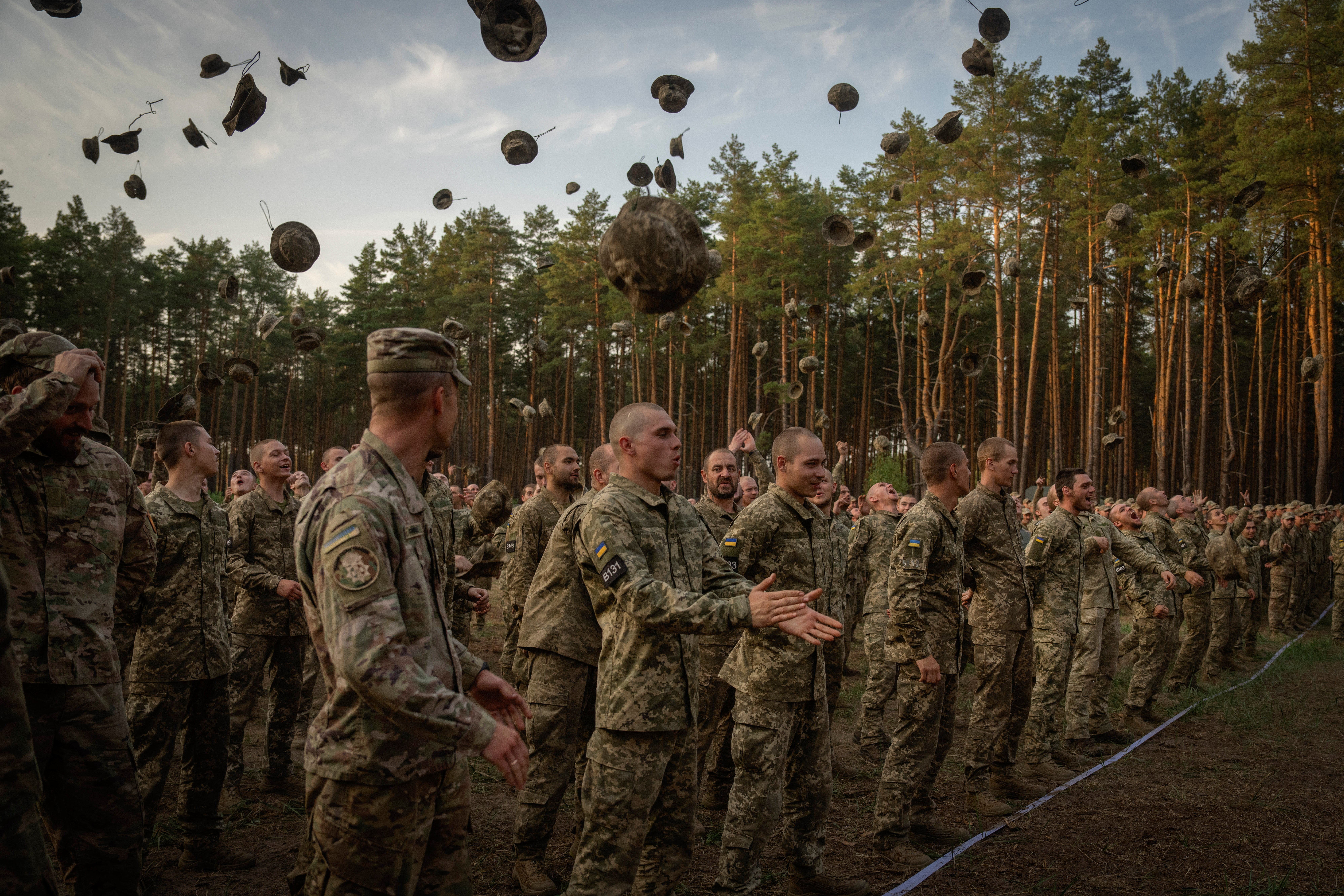Ukraine passes controversial mobilisation bill to boost troop numbers to fight Putin’s invasion
It comes after Russia launched another massive drone and rocket assault across Ukraine – destroying a major power plant outside Kyiv

Ukraine’s parliament has passed a controversial mobilisation bill as it seeks more troops to fight against Vladimir Putin’s invading forces – after a general said that Russian soldiers outnumbered Kyiv’s by up to ten times on the battlefield in the east.
The legislation, which must be signed by president Volodymyr Zelensky before it becomes law, is seen as crucial for Ukraine to address what military analysts say are major manpower problems.
Senior Ukrainian military personnel have cited the lack of manpower as one of the two most significant reasons – the other being artillery shortages – for Russia being able to regain the initiative on the frontline in recent months.
Before his resignation late last year, the former military chief Valerii Zaluzhny had called for 500,000 more Ukrainians to be mobilised.
“Pass this law and the Ukrainian armed forces will not let down you or the Ukrainian people,” General Yuriy Sodol, commander of the joint forces, told MPs. “The enemy outnumbers us by seven to 10 times, we lack manpower,” said Sodol, who is commanding Kyiv’s troops in the Kharkiv, Donetsk and Luhansk regions.
Earlier this week, Oleksandr Pavliuk, the ground forces commander, called on Ukrainians to enlist in the army or to be ready to serve.
“We must realise, no one will be able to sit tight,” he wrote on Facebook. “No matter how much help we get, no matter how many weapons we have, we lack people. The equipment doesn’t drive by itself, the weapon doesn’t shoot by itself, and the drone won’t fly by itself.”
The new bill has undergone more than 4,000 amendments and an initial, more contentious version was withdrawn in January as politicians in Kyiv disagreed over how best to mobilise more civilians.
The most controversial aspect of the new bill is the removal of provisions on demobilisation, which previously foresaw soldiers having the right to leave the military after 36 months of service.
A spokesperson for Ukraine’s defence ministry said it was too “hasty” to include such a provision in this bill given the dangerous situation on the frontline.
“The general staff, which understands the operational situation and the threats and risks that the state faces, has expressed their concerns [with the demobilisation of troops],” spokesperson Dmytro Lazutkin told Ukrainian TV broadcasters earlier this week. “We cannot make hasty decisions right now.”
He said a separate bill on demobilisation will be drafted in the next eight months.
According to a letter obtained by Ukrainska Pravda, the removal of demobilisation from the bill came at the direct request of the commander-in-chief of the armed forces, Oleksandr Syrskyi.
Of the provisions remaining in the bill, key points include the right of disabled soldiers and those who have returned from captivity to discharge themselves, and the introduction of mandatory medical commission checks for those who previously held the “partially eligible” status.
The new bill was passed in its final reading with a majority of 283 votes after months of deliberations, Yaroslav Zhelezniak, a lawmaker for the Holos party, wrote on Telegram.
A full, final text with all the amendments was not immediately published on the parliament’s websites.
It was clear the bill sets no limit for the length of time that mobilised soldiers have to serve during the war, a highly sensitive issue for the many thousands of people who joined the army when Russia launched its full-scale invasion.
Lawmaker Oleksandr Fedienko said the adoption of the bill sent a “message to our partners that we are ready to retake our territory and we need weapons”.
It took the Ukrainian parliament several months to put the bill to a final vote this week, as politicians accused each other of drafting poorly-worded amendments and lacking the political will to approve unpopular changes.
It comes as Russia launched another barrage of missiles and drones across Ukraine overnight, an attack that destroyed a key electricity plant near Kyiv, energy company Centrenergo said. Several other power facilities across the country were also hit.
Ukraine’s air force commander said air defences had shot down 18 of the incoming missiles and 39 drones. The attack used 82 missiles and drones in total, the military said.
The onslaught sparked further calls from Mr Zelensky for more air defences from Kyiv’s Western allies.
“All of our European neighbours and other partners see Ukraine’s critical need for air defence systems,” he wrote on X. “Right now, with our ability to overcome Russian terror, the world can demonstrate that all terror is treated equally as a crime.
“However, if Russia is allowed to continue doing so, if Russian missiles and ‘Shahed’ drones continue to strike not only Ukraine but also the resolve of our allies, this will amount to a global licence for terror.
“We need air defence systems and other defence assistance, not just turning a blind eye and having lengthy discussions,” he added.
Subscribe to Independent Premium to bookmark this article
Want to bookmark your favourite articles and stories to read or reference later? Start your Independent Premium subscription today.

Join our commenting forum
Join thought-provoking conversations, follow other Independent readers and see their replies